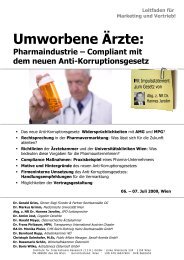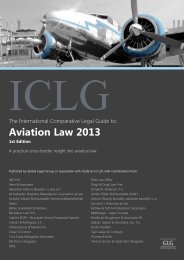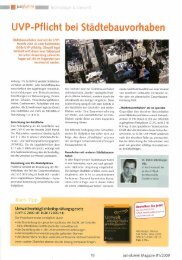Getting the deal through - Air Transport 2011 - Jarolim
Getting the deal through - Air Transport 2011 - Jarolim
Getting the deal through - Air Transport 2011 - Jarolim
Create successful ePaper yourself
Turn your PDF publications into a flip-book with our unique Google optimized e-Paper software.
AUSTRIA<br />
<strong>Jarolim</strong> Flitsch Rechtsanwaelte GmbH<br />
Update and trends<br />
The main aviation law issues currently discussed in Austria is <strong>the</strong><br />
adequacy of <strong>the</strong> EC Regulation 261/2004 (establishing common<br />
rules on compensation and assistance to passengers in <strong>the</strong> event<br />
of denied boarding and of cancellation or long delay of flights) with<br />
regard to incidents of force majeure, eg volcanic ash. Especially in <strong>the</strong><br />
light of <strong>the</strong> economic crises, which had also a strong impact on <strong>the</strong><br />
aviation industry, <strong>the</strong> justification for <strong>the</strong> transfer of costs and risk to<br />
<strong>the</strong> airlines (eg costs for accommodation and re-routing) is discussed,<br />
especially between airlines an organizations for customer protection.<br />
Ano<strong>the</strong>r issue is <strong>the</strong> implementation of <strong>the</strong> Council Directive<br />
2009/12/EC on airport charges, which provides a legal framework<br />
for setting airport charges and reflects current commercial practices.<br />
Once implemented, <strong>the</strong> new legislation will promote better dialogue<br />
between airlines and airports and ensure transparency, nondiscrimination<br />
and appropriate consultation between airlines and<br />
airports under an independent regulator in each member state.<br />
Necessary national legislative changes, which have to be enacted<br />
before 15 March <strong>2011</strong>, but have not yet been made.<br />
Fur<strong>the</strong>r, <strong>the</strong> 2008 implemented procedure to ensure nondiscriminatory<br />
and transparent distribution of limited traffic rights<br />
among eligible community air carriers now has to be applied in<br />
practice in Austria.<br />
of general interest, for example, regional development or accessibility.<br />
The respective airport’s size may also cause an aid to be justified.<br />
The European Commission has decided that state aid granted to<br />
airports with fewer than one million passengers per year, entrusted<br />
with a mission of general economic interest, should be exempted<br />
from <strong>the</strong> notification obligation and declared compatible.<br />
As concerns start-up aid to airlines at regional airports, <strong>the</strong> European<br />
Commission identifies a general interest in increasing mobility<br />
by attracting new airlines to regional airports and introducing new<br />
destinations. According to <strong>the</strong>se guidelines, state aid for <strong>the</strong> operation<br />
of new routes (in form of marketing support) should be allowed<br />
for a maximum of three years (five years in <strong>the</strong> case of <strong>the</strong> outermost<br />
regions).<br />
36 Must clearance from <strong>the</strong> competition authorities be obtained before<br />
state aid may be granted?<br />
Before state aid – in <strong>the</strong> sense of <strong>the</strong> EU provisions – may be granted,<br />
<strong>the</strong> member state must notify its intention to grant such financial<br />
support to <strong>the</strong> European Commission. According to <strong>the</strong> ‘standstill<br />
clause’, no state aid may be put into effect, before <strong>the</strong> European<br />
Commission has cleared <strong>the</strong> notified measure (article 108 TFEU<br />
and EC Council Regulation No. 659/1999). Any state aid which is<br />
granted without clearance of <strong>the</strong> European Commission is automatically<br />
considered unlawful.<br />
37 If so, what are <strong>the</strong> main procedural steps to obtain clearance?<br />
The procedure to obtain clearance is laid out in EC Council Regulation<br />
No. 659/1999, laying down detailed rules for <strong>the</strong> application of<br />
article 88 (now article 108 TFEU).<br />
Thus, a member state planning to grant state aid must notify <strong>the</strong><br />
European Commission of this plan in sufficient time by providing<br />
all <strong>the</strong> necessary information and documentation needed to determine<br />
<strong>the</strong> lawfulness of such state aid. The European Commission<br />
provides standardised notification forms which shall be submitted<br />
electronically. The European Commission will <strong>the</strong>n make a preliminary<br />
decision within two months whe<strong>the</strong>r or not <strong>the</strong> notified measure<br />
constitutes state aid under <strong>the</strong> relevant provisions. If <strong>the</strong> European<br />
Commission doubts <strong>the</strong> compatibility of <strong>the</strong> notified measure with<br />
<strong>the</strong> applicable rules, it will initiate formal investigation proceedings<br />
(in which o<strong>the</strong>r member states and concerned parties may be heard).<br />
If <strong>the</strong> European Commission does not take any fur<strong>the</strong>r steps within<br />
<strong>the</strong> period of two months, <strong>the</strong> notified measure may be considered<br />
to have been authorised.<br />
A simplified procedure is provided for certain alterations of existing<br />
state aid.<br />
European Commission may render a ‘recovery decision’, obliging<br />
<strong>the</strong> respective member state to take all necessary measures to recover<br />
<strong>the</strong> unlawfully granted state aid. In addition, <strong>the</strong> beneficiary of an<br />
unlawful state aid is required to pay interest until <strong>the</strong> date of <strong>the</strong> recovery.<br />
The recovery measures are determined by national law. In Austria,<br />
<strong>the</strong> applicable recovery procedure (civil or administrative procedure)<br />
and <strong>the</strong> competent authority (civil court or administrative authority)<br />
depend on whe<strong>the</strong>r <strong>the</strong> financial aid was granted by a private or public<br />
act. Also, competitors may contest such unlawfully granted state aid as<br />
an unfair competition measure before <strong>the</strong> civil courts.<br />
Miscellaneous<br />
39 Is <strong>the</strong>re any aviation-specific passenger protection legislation?<br />
To name <strong>the</strong> most relevant provisions, EC Regulation No. 261/2004<br />
establishing common rules on compensation and assistance to<br />
passengers in <strong>the</strong> event of denied boarding and of cancellation or<br />
long delay of flights, is of great relevance in Austria. Carriers are<br />
obliged to pay a predefined compensation sum or provide assistance<br />
in certain cases of denied boarding, cancellation and delay.<br />
The EC Regulation No. 80/2009 on a Code of Conduct for<br />
computerised reservation systems and repealing Council Regulation<br />
(EEC) No. 2299/89, provides a code of conduct for computerised<br />
reservation systems (CRS).<br />
EEC Directive No. 90/314 on package travel, package holidays<br />
and package tours was also implemented in Austria (article 30b and<br />
following of <strong>the</strong> Austrian Consumer Protection Act (KSchG)).<br />
As concerns disabled passengers, EC Regulation No. 1107/2006<br />
concerning <strong>the</strong> rights of disabled persons and persons with reduced<br />
mobility when travelling by air, provides certain obligations for carriers<br />
and o<strong>the</strong>r companies engaged in aviation to grant access to<br />
facilities and aircraft, is applicable.<br />
According to EC Regulation No. 1008/2008 on common rules<br />
for <strong>the</strong> operation of air services in <strong>the</strong> Community <strong>the</strong> published<br />
price for <strong>the</strong> service (including publishing on <strong>the</strong> internet) has to<br />
include <strong>the</strong> fare and all applicable taxes, charges, surcharges and fees<br />
which are unavoidable and foreseeable at <strong>the</strong> time of publication. In<br />
addition, details must be given of <strong>the</strong> different components of <strong>the</strong><br />
price (fares, taxes, airport charges and o<strong>the</strong>r costs). Discrimination<br />
in access to fares between passengers or between users of <strong>the</strong> cargo<br />
service on <strong>the</strong> basis of <strong>the</strong>ir place of residence or <strong>the</strong>ir nationality<br />
within <strong>the</strong> Community is prohibited.<br />
In addition to <strong>the</strong> EC Regulation, <strong>the</strong> Austrian Pricing Act<br />
requires airlines for transparency reasons to mark <strong>the</strong> total (gross)<br />
airfare payable for <strong>the</strong>ir services in advertisements and o<strong>the</strong>r public<br />
announcements (see also question 12).<br />
38 If no clearance is obtained, what procedures apply to recover<br />
unlawfully granted state aid?<br />
The procedure to recover unlawfully granted state aid is set out in<br />
article 14 of EC Council Regulation No. 659/1999. In such case, <strong>the</strong><br />
40 Are <strong>the</strong>re mandatory insurance requirements for <strong>the</strong> operators of<br />
aircraft?<br />
Article 164 of <strong>the</strong> Austrian Aviation Act (LFG) regulates minimum<br />
insurance requirements for carriers in respect of passengers,<br />
28 <strong>Getting</strong> <strong>the</strong> Deal Through – <strong>Air</strong> <strong>Transport</strong> <strong>2011</strong>





